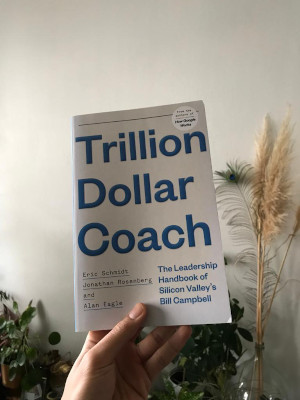How to be a better leader?

One month ago, Avi Ram (an experienced International Business Program Director and Change Manager) was the speaker at the Innosuisse Start-up Training Business Concept weekly course.
He delved into the financing part of a start-up, how to attract investors, showing them we know the market’s pain and that possible clients have already shown interest in the product. Aside his great sharing of experience in this start-up ecosystem, he suggested the following book : Trillion Dollar Coach by Eric Schmidt, Jonathan Rosenberg, and Alan Eagle as being THE book to read. Keen on knowing what was giving him stars in the eyes when suggesting this book, I decided to give it a try.
I grabbed the book for a few bucks on Vinted and began reading it. What I can say first, is that I really enjoyed the accessibility and easiness of reading, plus it is a quick read !
The book tells the story of Bill Campbell, ‘coach’ of a lot of big names in the Silicon Valley. The authors make us walk through the path of being a manager (leader?) to building your team as an entity of support, respect, trust and love. Yes, love. Surprisingly, it seems to be one of the key points even in business to grow a successful company!
I genuinely liked the structure of the book and the Take Home Messages at the end of each advice. Plus, they have done the effort to be research-based, adding even more value to their tips.
Also, I am well aware that this book is written by white males, working in a highly competitive, tech environment. They also acknowledge this and address few points about that, which is a good point for them. In that sense, inclusion in a broader way is something I feel is missing in this book.
If you want to read it, pin me and I can lend it to you with pleasure ! I look forward to talking about it with you if you have read it ! Please do not hesitate ☀️
Here are five tips that grasped my attention :
- Sharing what we enjoy outside work make the team care more about their teammates. (Geimer et al., 2015; Mehl et al., 2010)
- Never tell people what to do. Listen and ask them questions instead. This way, they can refine their priorities and reassess their use of time and effort. (Van Quaquebeque & Felps, 2018)
- No consensus. This is why I like the 1-2-all method when working in groups, and I can say it was enjoyable by student taking R courses I taught at TakeOver.
- Give a constructive feedback when the person is feeling safe, never during or right after a moment of frustration. Let the frustration go away, so that the better the feedback and the better the listening.
- Caring about people can be trained. Ask about people’s lives outside of work, understand their families, etc. Also try elevator chat : “How is it going? What are you working on?” (Kanov et al., 2004)